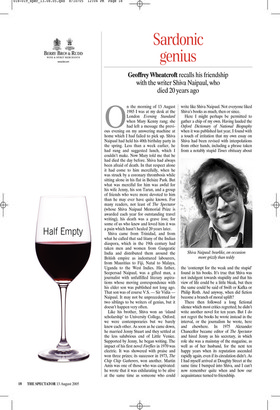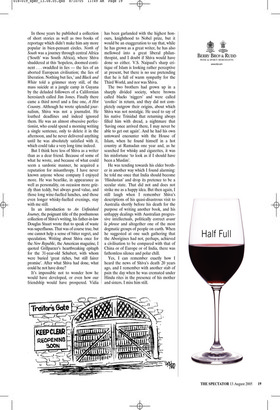Sardonic genius
Geoffrey Wheatcroft recalls his friendship with the writer Shiva Naipaul, who died 20 years ago On the morning of 13 August 1985 I was at my desk at the London Evening Standard when Mary Kenny rang; she had left a message the previous evening on my answering machine at home which I had failed to pick up. Shiva Naipaul had held his 40th birthday party in the spring. Less than a week earlier, he had rung and suggested lunch, which I couldn’t make. Now Mary told me that he had died the day before. Shiva had always been afraid of death. In that respect alone it had come to him mercifully, when he was struck by a coronary thrombosis while sitting alone in his flat in Belsize Park. But what was merciful for him was awful for his wife Jenny, his son Tarun, and a group of friends who were more devoted to him than he may ever have quite known. For many readers, not least of The Spectator (whose Shiva Naipaul Memorial Prize is awarded each year for outstanding travel writing), his death was a grave loss; for some of us who knew and loved him it was a pain which hasn’t healed 20 years later.
Shiva came from Trinidad, and from what he called that sad litany of the Indian diaspora, which in the 19th century had taken men and women from Gangeatic India and distributed them around the British empire as indentured labourers, from Mauritius to Fiji, Natal to Malaya, Uganda to the West Indies. His father, Seepersad Naipaul, was a gifted man, a journalist with unfulfilled literary aspirations whose moving correspondence with his elder son was published not long ago. That son was of course V.S. — Sir Vidia Naipaul. It may not be unprecedented for two siblings to be writers of genius, but it doesn’t happen very often.
Like his brother, Shiva won an ‘island scholarship’ to University College, Oxford; we were contemporaries but we barely knew each other. As soon as he came down, he married Jenny Stuart and they settled at the less salubrious end of Little Venice. Supported by Jenny, he began writing. The impact of his first novel Fireflies in 1970 was electric. It was showered with praise and won three prizes; its successor in 1973, The Chip Chip Gatherers, won another. Martin Amis was one of those who was captivated: he wrote that it was exhilarating to be alive at the same time as someone who could write like Shiva Naipaul. Not everyone liked Shiva’s books as much, then or since.
Here I might perhaps be permitted to gather a chip of my own. Having lauded the Oxford Dictionary of National Biography when it was published last year, I found with a touch of irritation that my own essay on Shiva had been revised with interpolations from other hands, including a phrase taken from a notably stupid Times obituary about the ‘contempt for the weak and the stupid’ found in his books. It’s true that Shiva was not indulgent towards stupidity and that his view of life could be a little bleak, but then the same could be said of Swift or Kafka or Philip Roth. And anyway, when did fiction become a branch of moral uplift?
There then followed a long fictional silence which most critics regretted; he didn’t write another novel for ten years. But I do not regret the books he wrote instead in the interval, or the journalism he wrote, here and elsewhere. In 1975 Alexander Chancellor became editor of The Spectator and hired Jenny as his secretary, in which role she was a mainstay of the magazine, as well as of her husband, for the next ten happy years when its reputation ascended rapidly again, even if its circulation didn’t. As I had myself arrived at Doughty Street at the same time I bumped into Shiva, and I can’t now remember quite when and how our acquaintance turned to friendship. In those years he published a collection of short stories as well as two books of reportage which didn’t make him any more popular in bien-pensant circles. North of South was a journey through central Africa (‘South’ was South Africa), where Shiva shuddered at this ‘hopeless, doomed continent ... swaddled in lies — the lies of an aborted European civilisation; the lies of liberation. Nothing but lies,’ and Black and White told a grimmer story still, of the mass suicide at a jungle camp in Guyana by the deluded followers of a Californian heresiarch called Jim Jones. Finally there came a third novel and a fine one, A Hot Country. Although he wrote splendid journalism, Shiva was not a journalist. He loathed deadlines and indeed ignored them. He was an almost obsessive perfectionist, who could spend a morning writing a single sentence, only to delete it in the afternoon, and he never delivered anything until he was absolutely satisfied with it, which could take a very long time indeed.
But I think here less of Shiva as a writer than as a dear friend. Because of some of what he wrote, and because of what could seem a sardonic manner, he acquired a reputation for misanthropy. I have never known anyone whose company I enjoyed more. He was bearlike, in appearance as well as personality, on occasion more grizzly than teddy, but always good value, and those long wine-fuelled lunches, and those even longer whisky-fuelled evenings, stay with me still.
In an introduction to An Unfinished Journey, the poignant title of the posthumous collection of Shiva’s writing, his father-in-law Douglas Stuart wrote that to speak of waste was superfluous. That was of course true, but one cannot help a sense of bitter regret, and speculation. Writing about Shiva once for the New Republic, the American magazine, I quoted Grillparzer’s heartbreaking epitaph for the 31-year-old Schubert, with whom were buried ‘great riches, but still fairer promise’. After what Shiva had done, what could he not have done?
It’s impossible not to wonder how he would have developed, or even how our friendship would have prospered. Vidia has been garlanded with the highest honours, knighthood to Nobel prize, but it would be an exaggeration to say that, while he has grown as a great writer, he has also mellowed into a great liberal philanthropist, and I doubt if Shiva would have done so either. V.S. Naipaul’s sharp critique of Islam is looking rather perceptive at present, but there is no use pretending that he is full of warm sympathy for the Third World, and nor was Shiva.
The two brothers had grown up in a sharply divided society, where browns called blacks ‘niggers’ and were called ‘coolies’ in return, and they did not completely outgrow their origins, about which Shiva was not nostalgic. He used to say of his native Trinidad that returning always filled him with dread, a nightmare that ‘having once arrived there, I may never be able to get out again’. And he had his own untoward encounter with the House of Islam, when he found himself in a hot country at Ramadan one year and, as he searched for whisky and cigarettes, it was his misfortune ‘to look as if I should have been a Muslim’.
He was tending towards his elder brother in another way which I found alarming: he told me once that India should become ‘Hindustan’ and drop its pretence to be a secular state. That did not and does not strike me as a happy idea. But then again, I still laugh when I remember Shiva’s descriptions of his quasi-disastrous visit to Australia shortly before his death for the purpose of writing another book, and his unhappy dealings with Australian progressive intellectuals, politically correct avant la phrase and altogether one of the most dogmatic groups of people on earth. When he suggested at one such gathering that the Aborigines had not, perhaps, achieved a civilisation to be compared with that of China or of Europe or of India, there was fathomless silence and polar chill.
Yes, I can remember exactly how I heard the news of Shiva’s death 20 years ago, and I remember with another stab of pain the day when he was cremated under Hindu rites in the presence of his mother and sisters. I miss him still.












































 Previous page
Previous page